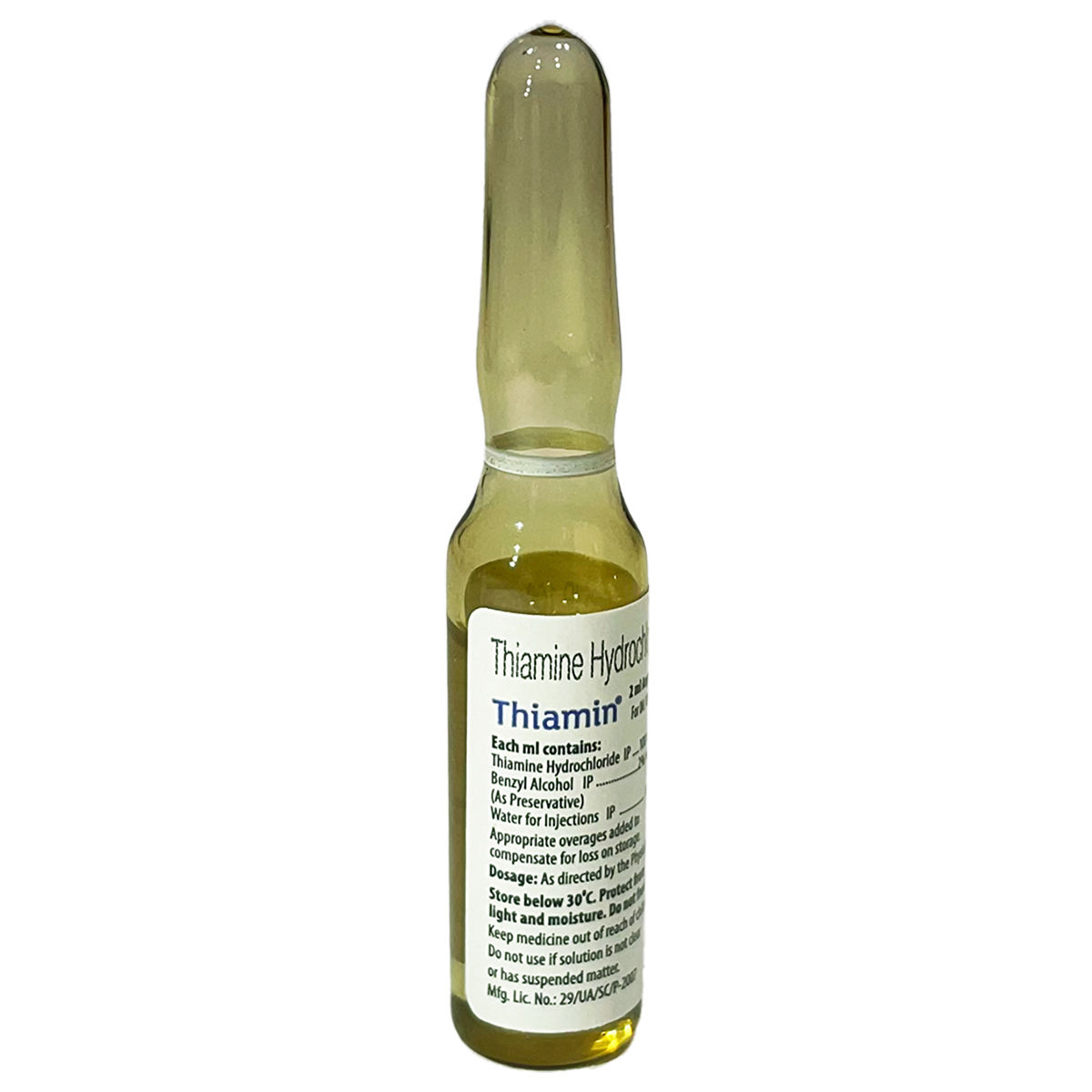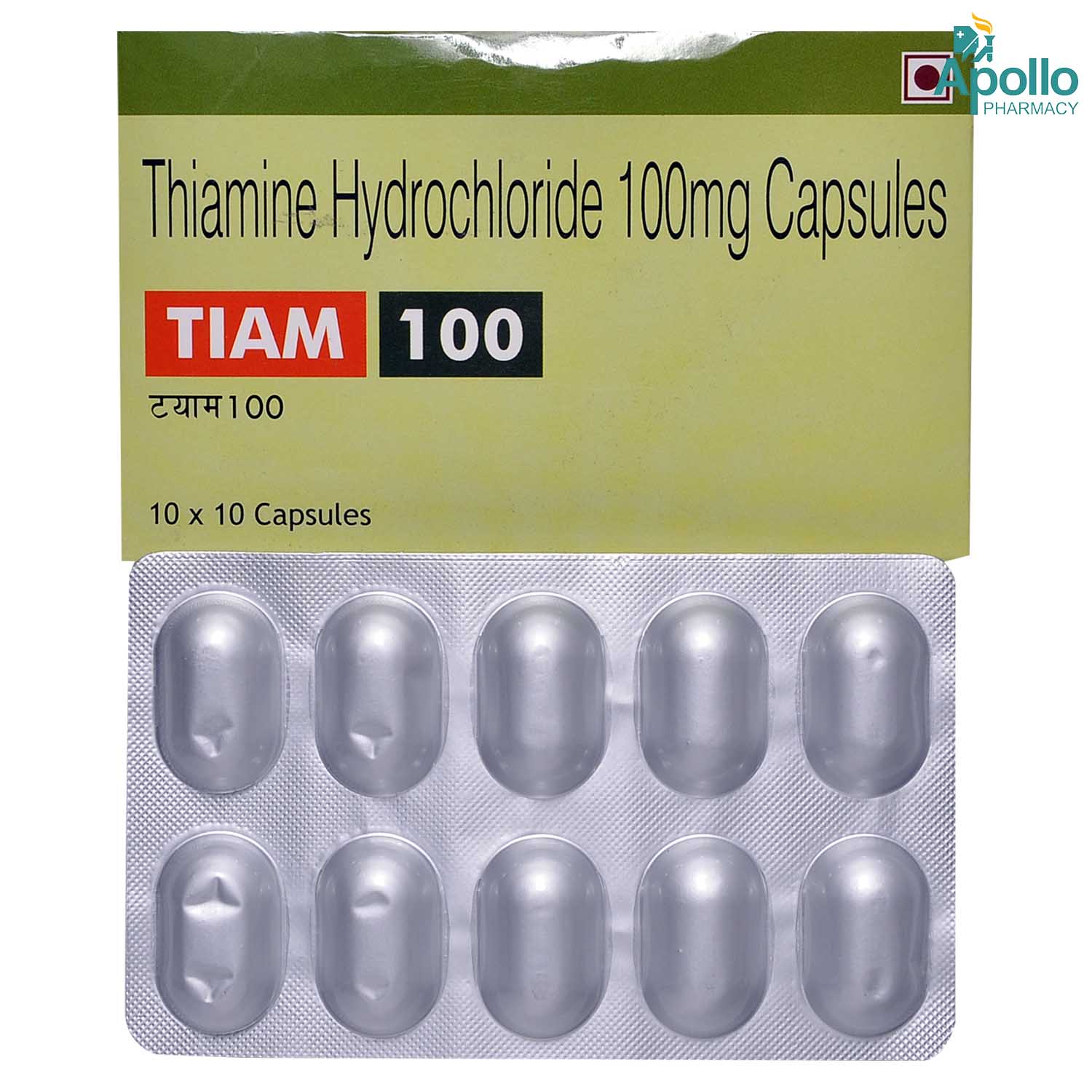Thiamine
About Thiamine
Thiamine belongs to the group of vitamin supplements primarily used to treat thiamine (Vitamin B1) deficiency, which can happen due to a disease called Beri-Beri, various chronic conditions affecting vital organs, alcoholism or the use of certain drugs. Thiamine is also used in the treatment of Wernicke's encephalopathy and Korsakoff's psychosis.
Thiamine is composed of Thiamine (Vitamin B1), which generates energy from nutrients and converts food molecules into energy so that the body can function seamlessly. Thiamine is vital for cells' growth, development, and functioning.
Take Thiamine as advised by the physician. In some cases, Thiamine may cause mild stomach upset, nausea, vomiting, stomach pain, and diarrhoea. Most of these side effects do not require medical attention and will resolve gradually over time. However, if the side effects persist or worsen, consult a doctor.
Inform the doctor if you are allergic to any of the components in Thiamine. Consult your doctor if you are pregnant or breastfeeding. Tell your doctor if you are taking supplements, herbal products, or other medicines. Please consult your doctor if you have any concerns regarding the usage of Thiamine in children.
Uses of Thiamine
Medicinal Benefits
Thiamine contains Thiamine. It is used to address thiamine deficiency resulting from disease, drugs, or alcoholism. It is also used to treat Beri-Beri, Wernicke’s encephalopathy, Korsakoff’s psychosis, and various chronic conditions. Thiamine binds with ATP (the energy currency of the cell) and forms thiamine diphosphate, a molecule that mediates various processes in energy-producing pathways in the body, such as carbohydrate metabolism and hexose-uptake in the HMP pathway. Thereby, thiamine converts food into energy and finds application in the treatment of various states produced by its deficiency.
Directions for Use
Storage
Side Effects of Thiamine
- Nausea
- Vomiting
- Stomach pain
- Diarrhoea
- Mild stomach upset
Drug Warnings
Inform the physician if you are allergic to any of the components in Thiamine. Let your doctor know if you suffer from any diseases or allergies. Consult your physician before using Thiamine during pregnancy or if you are breastfeeding. Please consult your doctor if you have any concerns regarding the usage of Thiamine in children.
Drug Interactions
Drug-Drug Interactions: No interactions found.
Drug-Food Interactions: No interactions found.
Drug-Disease Interactions: No interactions found.
Drug-Drug Interactions Checker List:
Safety Advice

Alcohol
cautionAlcohol can reduce thiamine levels in the body and affect the metabolism of Thiamine. Hence, avoid alcohol consumption.

Pregnancy
cautionNot enough studies have been done on pregnant women. Thiamine should be used with caution in pregnancy. Your doctor will prescribe this medicine only if the benefits outweigh the risks.

Breast Feeding
cautionThiamine should be used with caution in nursing mothers. If you are breastfeeding, please consult your doctor before taking this medicine.

Driving
safeThiamine does not affect your ability to drive.

Liver
consult your doctorThiamine is probably safe on the liver. Please consult your doctor in case of any concerns.

Kidney
consult your doctorThiamine is probably safe on the kidney. Please consult your doctor in case of any concerns.

Children
cautionPlease consult your doctor. Your doctor will weigh the benefits and risks before prescribing Thiamine for your child.
Habit Forming
Diet & Lifestyle Advise
- Load up on a nutrient-rich diet focused on thiamine. Thiamine-rich foods include fish, meats, seeds, beans, legumes, thiamine-enriched breakfast cereals and nuts.
- Eat fresh foods. Cooking and processing reduce the thiamine content of food.
- Opt for plenty of green leafy vegetables and seasonal fruits.
- Stay hydrated by drinking plenty of water.
- Doing weight-bearing exercises such as brisk walking, jogging, tennis, or even dance can be very useful in promoting overall physical health. However, do not over-exert yourself if you feel too tired.
- Muscle training activities such as yoga and Pilates can also be very helpful in promoting good physical health.
- Try meditation and psychotherapy to reduce stress.
- Limit your alcohol intake. Drink only in moderation. Be open to seeking help if you are suffering from alcohol addiction.
Special Advise
Thiamine might affect test results; therefore, inform the physician that you are taking Thiamine if you are undergoing any blood tests, scans, or other medical tests.
Patients Concern
Disease/Condition Glossary
Thiamine deficiency: Thiamine deficiency occurs when the body is unable to absorb or get enough thiamine from food. It can also occur if you are excreting thiamine quickly from the body.
Beri-Beri: Beriberi is a disease caused by Thiamine deficiency. It is characterized by a loss of appetite, lethargy, numbness in the limbs, shortness of breath, muscle weakness, nerve problems and swelling in the extremities.
Wernicke's Encephalopathy: Wernicke's encephalopathy is commonly seen in alcoholics. It is a neurological condition characterized by a triad marked by difficulty in walking (ataxia), nystagmus (uncoordinated movements of the eyes)/eye weakness and mental confusion.
Korsakoff’s Psychosis: Korsakoff’s psychosis is commonly seen due to alcoholism, poor diet or the effects of strong drugs such as chemotherapy. It is characterized by impaired memory, confabulation and Wernicke’s triad of symptoms.
FAQs
Thiamine is used to treat Thiamine deficiency, Beri-Beri, Wernicke's encephalopathy and Korsakoff's Psychosis.
Thiamine works by participating in various energy-producing pathways in the body. It helps in converting food into energy.
While Thiamine may not reduce cravings, it helps tremendously post-recovery and rehabilitation. Thiamine deficiency is seen in alcoholics and can cause various problems such as delirium, confusion, difficulty walking, and memory problems. Thiamine helps address these issues efficiently.
In case you miss a dose, take it as soon as possible. However, revert to your original schedule if it is almost time for the next dose. Never take a double dose.








